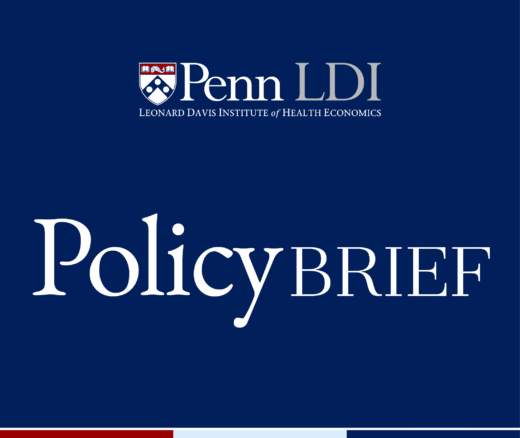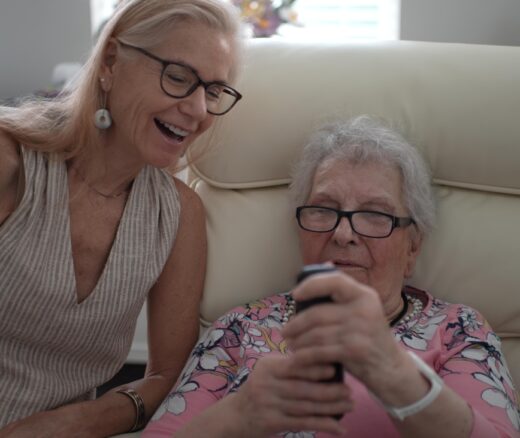
Analysis of the Rural Health Transformation Program
Memo: Response to Request for Analysis
Blog Post | News | Video
A team led by LDI Senior Fellow and Perelman School of Medicine faculty member Lauren Eberly, MD, MPH, at a Navajo Nation hospital in New Mexico has developed a simple intervention that increased the uptake of guideline-directed heart failure therapy drugs by 53%. Titled “Telephone-Based Guideline-Directed Medical Therapy Optimization in Navajo Nation: The Hózhó Randomized Clinical Trial,” the study was published in the April issue of JAMA Internal Medicine.

“We found a 53% increase in the uptake of guideline-directed medical therapy to be a very significant effect,” said Eberly. “In some ways, the magnitude of the effect was surprising, but in many ways, it was not surprising in how it speaks to the importance of designing an intervention that centers the community perspective and needs.”
Part of an Indian Health Service (IHS) Innovations Award supported by the IHS headquarters Office of Quality, the study was done at the Gallup Indian Medical Center in New Mexico. The tested intervention was built around a telehealth-based strategy for remote initiation and titration of appropriate guideline-directed drug therapies for patients with heart failure with reduced ejection fraction. That means their heart was pumping insufficient amounts of blood in relation to their body’s minimal needs.
“Heart failure is a major cause of morbidity and mortality for our patient population in Eastern Navajo Nation,” said Eberly. “Unfortunately, the cardiovascular health of the American Indian and Alaska Native population has really been under prioritized and is severely understudied. Therefore, there’s really a paucity of data regarding cardiovascular disease burden and outcomes in this population.”
“From some of our prior work, we know that among elderly American Indian and Alaska Native patients with Medicare nationally, the prevalence of heart failure is nearly 30%,” Eberly continued. “That’s incredibly high. Prior studies of these same groups also showed the incidence of coronary artery disease, which is a major cause of heart failure, is double that of other racial groups in the United States.”
In Navajo Nation, overall health issues are compounded by the fact that many residential areas lack electricity or running water and are located along remote rural roads that are often impassable in winter.

The goal of the IHS Innovations Award study was to identify and address the major barriers to heart failure care throughout the Eastern section of the larger Navajo reservation that sprawls across 27,000 square miles of New Mexico, Arizona and Utah and is home to 167,000 people.
“The background of our work was that guideline-directed medical therapy for heart failure saves lives and really improves quality of life for patients,” said Eberly. “However, nationally, these medicines are really underutilized, and we know that racial inequities in their use have been well documented. There’s also really been a paucity of efforts designed specifically to improve uptake of these therapies for racially marginalized patient groups, and particularly for American Indian patients.”

In close collaboration with the Navajo community and clinicians, the research team determined that the clinical barriers to the uptake of recommended heart failure therapies were clinical burden, time constraints, lack of comfort with newer heart failure therapies, and lack of comfort with newer clinical guidelines.
The main patient barriers to treatment were transportation and clinician availability.
“We worked with patients and community advisors to design a telehealth model in a reservation environment where there is limited broadband,” said Eberly. “Phone calls were really the optimal telehealth modality.”
The intervention was simple and targeted patients who had previously received an echocardiogram estimate of their heart pumping function. They would come into the hospital to pick up a blood pressure cuff. Research team members would review their medicine regimen to identify and prescribe any missing drug therapy over the phone. Over the next month, the patient would be contacted by phone multiple times at home for blood pressure readings that would be used to adjust the drug dosage over the phone. The goal was to optimize the patient’s heart failure regimen by the end of 30 days.
Aside from the greatly increased use of guideline-directed therapy in the study group, the research found that the telehealth intervention also reduced the rate of the participants’ heart failure hospitalizations.
“Our strategy leveraged the electronic health record on a health system level to identify patients not receiving appropriate therapy, and subsequently optimize therapy without relying on in-person visits for specialty care,” said Eberly. “We believe that such models can advance equity and combat structural racism in cardiovascular care.”

Eberly, a staff cardiologist at the Gallup Indian Medical Center, is also an Assistant Professor of Medicine in the Penn Medicine Division of Cardiovascular Medicine and a resident in the Penn Global Health Equities Track program that nurtures and trains health professionals to focus their careers on addressing health disparities domestically or globally.
“Back when I was raised in New Mexico, I saw firsthand the impact of poverty on health,” Eberly explained. “I was drawn to medicine because I saw it could be an incredible tool to advance justice.”
She has previously served with Partners in Health in Rwanda and Liberia, assisting with the implementation of nurse-driven care delivery models for noncommunicable diseases, with a special focus on heart failure.
Eberly earned her MD at the University of New Mexico School of Medicine and her MPH from the Harvard School of Public Health.


Memo: Response to Request for Analysis

Lessons from the Past, Imperatives for the Future

A New Study of a Sample of Facilities Found Half Without Any Behavioral Health Staff

Physicians Were Paid About 10% Less for Visits Involving Black and Hispanic Patients, With Pediatric Gaps Reaching 15%, According to a First-of-Its-Kind LDI Analysis

A New Review Finds Hospital Mergers Raise Prices Without Improving Care, and Urges Regulators to Stop Accepting Quality Claims to Justify Consolidations

Technology Helps Older Adults Stay at Home—But May Delay Necessary Transitions to Higher Levels of Care